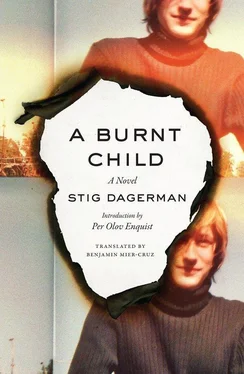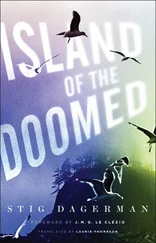One bit of news is that Papa got a dog. It’s black and doesn’t like me, but it likes Papa. I don’t know why. When I asked him what the dog’s name was, he answered, Hector. When I asked him why, he didn’t know, and when I asked him if he knew who Hector was, he didn’t know that either. But instead of explaining how he came up with the name, he got angry and said that he was just a simple carpenter. Anytime someone shows himself to be wiser than Papa, he always says that he’s just a simple carpenter. It’s his best defense, and he used it against Mama a lot. The next day, however, he told me who Hector was. So I suspected that he had looked up the name in the encyclopedia. When I checked, I rightly discovered that volume H was dusted off. But now I wonder where he got the name. I also wonder where he got the dog. He says he bought it at a pet shop on Södermannagatan, but the other day when I walked from one end of the street to the other, I couldn’t find a single pet store. I think it’s disgusting when he lies and when he lies so sloppily. I also think it’s disgusting that he’s started spying on me.
I don’t know if I hate him anymore. I just think that what he has done is disgusting, sordid, and filthy. I can’t stand the thought of him betraying Mama for an entire year while pretending to be so innocent the whole time. When Aunt Agnes called today, she said she knew that it was going on for a long time. I think it’s despicable how they go around gossiping about it. They should at least have some consideration for my feelings.
Well, Bengt, this has become a long letter, but since Mama’s death, I’ve had time to think things out. I miss her terribly, but I just can’t express exactly how much in a letter. It’s March now, and the nights are long. The other night I went out for a walk along the pier with Berit. She said she thought that spring was the most beautiful season of all. I told her I thought it was the ugliest, with all the slush and cats in heat. I shouldn’t have been so harsh, because I hurt her feelings. She isn’t sleeping well, she said. I know she can’t help it, but she’s very ugly without sleep. Mother was, too.
Good night, Bengt, and send everyone my regards.
Your friend,
Bengt
P.S. I forgot something: the other night I had a very horrible dream. I dreamt that I was standing in a large room surrounded by black candles. I was dressed very strangely, and I was sweating profusely. Suddenly, Papa came into the room and called me by the other woman’s name. Then I noticed I was wearing Mama’s red dress. Afterward, I realized that my dream was about my loyalty to Mama. Since then, I’ve been afraid, Bengt. I’m afraid that one day I’ll have to meet her—the other woman. I’m afraid because I know I won’t be able to control myself. I’m afraid I’m going to do something terrible.
P.P.S. Mama’s red dress has disappeared. When I asked Papa about it, he told me that he sold it. To prove he was telling the truth, he offered to share the money with me. I told him I didn’t want anything to do with that kind of money. I could tell he was glad to keep the money but hurt that I didn’t believe him. And I don’t believe him. I don’t know why, but I don’t.

AT THE END OF MARCH, the son often goes out for walks in the evenings. The father is also out on these evenings, but he doesn’t take walks. Well, he does, but they are very short. Even so, it’s a long time before he comes home again. He takes the dog out for walks because dogs need exercise. And every evening when he steps out the front door, he goes in a different direction. But every evening he ends up in the same place, which makes the dog very happy.
But before he ever gets there, it just so happens that he abruptly steps off the sidewalk and steps into a pub or a café, where he immediately looks for a newspaper, the biggest one he can find. Then he sits by the window with the paper covering his face as if he were reading. But he is not reading. Every time someone passes by on the street, he is peeking over the edge of the paper. Sometimes the son walks by. He strolls by slowly, and his eyes rove around as if they are looking for something. And they probably are. To a certain degree, the father is surprised to see his son out walking about, because they were just talking about it ten minutes ago. You should go outside and get some exercise, son, the father had said. You shouldn’t be indoors on such a beautiful evening. But the son told him that it would be better for him to finish the eighty pages he had to read before his lecture the next morning. Snapped at him almost.
So the father finds it somewhat strange when he suddenly passes by. But in a way he doesn’t. Because he was actually sitting there and waiting for him. Though the first few times he isn’t himself aware that he is waiting. But one evening, right after the son passes by, the dog starts whimpering at his feet. Then he realizes that he’s sitting with his foot pressed hard against the floor and that the dog’s leash is pressed between his sole and the floor. That’s why the dog is whimpering. It can’t lift its head off the ground. But it’s not supposed to, because if its head were raised, then the dog could be seen from the street.
Since then, the father knows why he is waiting. And since then, he is never at ease until he has seen the son walk by. If, one evening, he doesn’t happen to walk by, then the father waits until it’s very dark out. Then he sneaks onto the street like a thief sneaks into a house. Then he runs the whole way. The dog runs, too, but it’s faster. And when they arrive, they are both panting.
But one evening in March, when it is unusually warm and has just lightly rained, the father gives a start when the son walked by. Yes, walked by, because he realized—after he has let the dog sit up between the table and the window—that he didn’t have to sit and wait that night. They had just walked together to the streetcar stop, where the son got on the nine to go to a lecture. This is why he gives a start. After that, he hits the dog on the nose with the palm of his hand, relieving some of his pain. Because even when you have expected it, it hurts to be deceived. To be the one deceiving doesn’t hurt nearly as much. But failing to notice that you have been deceived, when you have been expecting it all along, can keep you happy.
This is why the son is happy when the father comes home early that evening. And to make the father happy, too, he makes some coffee. As they drink it, he tells him about a funny thing that happened at the lecture. The father laughs loudly at the son’s story. But he isn’t happy, nor does he pull out his wallet. Then the son calls the dog because the father likes it when he pets it. When the dog comes, the son notices it has a brand-new shiny silver collar. It didn’t have it two hours ago. It had a leather one, brown and chewed up. He fondles the new collar for a while, and then, with a clenched fist, he hits the dog under its nose so that it yelps and scurries off to the father. The father slams his coffee cup on the table—since they always drink coffee without a saucer nowadays—and asks him what he’s doing.
Hector has a new collar, the son replies.
The son raises his cup and takes a sip, even though the cup is empty. Because it’s easier to really study a person when one is drinking. The father looks briefly into the son’s eyes. The funeral eyes. He thinks they are ugly, and he doesn’t like anything ugly. But there is something about ugliness that he fears. Therefore, it isn’t his son that he fears. It’s the ugliness inside him. And the ugliness inside him is so hideously similar to the dead wife that he immediately has to look at something else. So he looks at the dog. It doesn’t have beautiful eyes either, but at least they don’t frighten him. He also looks at the collar. The son has smudged its shiny surface. Otherwise, it’s smart and cold to the touch.
Читать дальше













